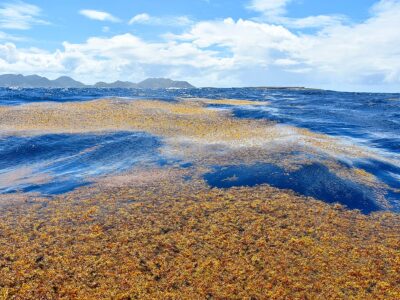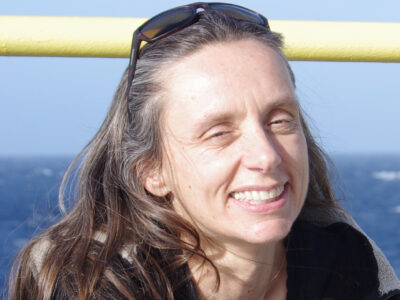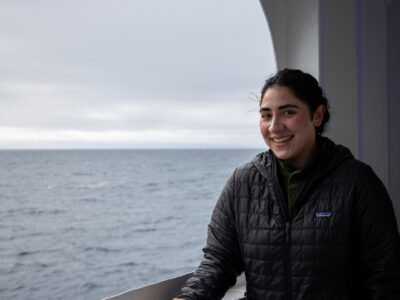It’s hard to explain how science works. Maybe scientists themselves don’t understand it completely. And even if they did, it’s complicated and technical. And in the case of climate science, it’s also politicized, which can make it even harder for someone on the outside to make sense of it.
A whole field of science communication exists around trying to make science accessible to the public, and climate science communication in particular has grown into its own special subfield, with professionals and newspaper columns and blogs and conferences and social media and so on.

We’re academics, so we cite our sources. Adam’s first one is comedian Marc Maron’s podcast, WTF. Adam has listened to it for many years, and likes it best when the other guests are also comedians. Not just because they are funny, but because when you hear two of them talking, you start to understand, in a way that you never would if they were being interviewed by a journalist, how their strange world works. They have had a lot of the same experiences and know a lot of the same people, and those bonds give you a way in. Hearing this over the years, Adam thought “someone should do this with scientists too!”
He was not going to be the one to do it, though, until Melanie, one of his Ph.D. students at the time, was in his office one day to talk about her thesis. The conversation eventually drifted to Adam’s book-writing plan for his upcoming sabbatical. He had started to record interviews with colleagues and students as background research for the book he had in mind. Melanie was on the list of people to be interviewed. Adam brought up the scheduling of the interview, and Melanie said, “You should do a podcast.”
The two of us remember the rest of the conversation a little differently (it would have been interesting if we’d recorded it, but of course we weren’t there yet). Adam remembers that Melanie talked him into it; Melanie remembers that Adam wasn’t very difficult to talk into it. What we do agree on is that after a few minutes, Adam looked at Melanie and asked, “If I were to do it, would you help me?” and Melanie said “ok!”
Over the next weeks and months, we figured out what we wanted to do, and started doing it. It has been a slow process — the interviews you’ll hear were all recorded months ago. It was important to us that this be a vanity project, done to satisfy our internal motivations only, and that we take our time. We have no funding, no institutional support — this is not a Columbia University project, though we hope our colleagues there will like it — and no one pushing us to do it any particular way, or to do it at all.
The only thing that’s really important to say now is that this has been a team effort, and in fact a family one. We have original theme music made by Adam’s son Eli. Artist Minnie Jardine, an old friend of Adam’s (and Eli’s godmother) showed an interest in the podcast early on, asked Adam to hear some of the first recordings, and quickly stepped into her role as “creative consultant and spiritual advisor”— meaning, she listens to all the interviews and, as someone with no scientific training (but a lot of interest, insight, and life experience), offers important feedback on what works and what doesn’t. She has bolstered our hope that Deep Convection might find an audience broader than just other climate scientists.
And, by sheer luck, we have had real professional help. Peter Nashel, a bigtime composer of music for film, television, and beyond, and is the founder and proprietor of duotone audio group, a full-service music and audio post-production studio in New York and Los Angeles. He’s also an old friend of Adam’s, from back in their college years when both of them wanted to be jazz musicians. (Pete executed that dream a lot better than Adam did.) Pete took an interest in the podcast when Adam described it to him over a beer one evening, and offered to have his people spruce up the audio quality. We enthusiastically accepted, and Pete assigned the task to Krissy Lassiter, one of his sound engineers, and Dana Hom, his business manager.
Dana and Krissy heard the recordings and got interested themselves. Both are artists — singers, when they’re not doing their day jobs — and the stories spoke to them, too. It was clear from our first conversations that they all understood what we were trying to do and that they could make it better, and we’re so grateful they’ve done that, now by editing the episodes as well as improving the sound.
That’s enough. Better not to over explain it. At some point, we’ll record an “episode zero” where we’ll talk more about how we got from the original idea to the podcast that’s now coming out: our intentions, our process, what we’ve learned in the course of recording a whole bunch of interviews (quite a few more than the 10 you’ll hear in the first season), and where we want the podcast to go in the future. Teaser: Adam wants Melanie to do some of the hosting. She has thought about it, and even practiced a bit, but decided not to do it in season one. She’ll be interviewed by Adam as a guest in a season one episode, though, so you’ll hear her voice there, and negotiations are ongoing about what happens in season two and thereafter.
For now, you’ll have to listen to find out more about what we’re doing here. Listen and subscribe on our website.



